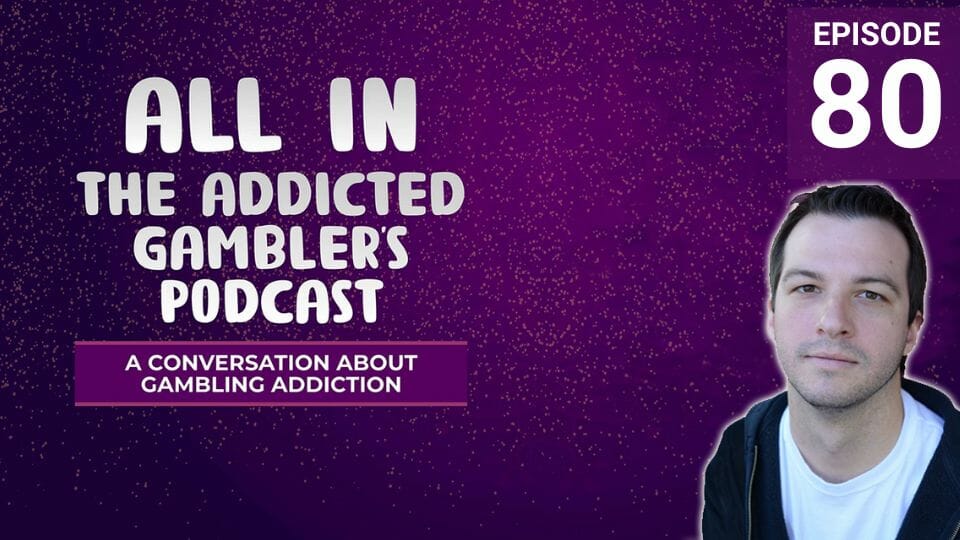Don’t miss this inspiring tale that will leave you eager to uncover the secrets of finding balance, support, and a new purpose in life. Listen to the episode here.
Super Summary
Tiffany shares her journey of overcoming compulsive gambling. She discusses the impact of her parents’ gambling habits, her struggles with life events, and how she sought help through Gamblers Anonymous. In her recovery, Tiffany finds balance, support, and a renewed sense of purpose, co-founding a women’s preferred meeting and starting a podcast to discuss gambling addiction from the perspective of 30-something-year-old women.
Main Topics:
- Tiffany’s gambling journey and its impact on her life
- The influence of her parents and significant life events
- The role of Gamblers Anonymous in her recovery
- The importance of balance, support, and self-care
- Tiffany’s involvement in women’s preferred meetings and podcasts
Welcome to the summary of an episode of the All in the Addicted Gamblers podcast, where Brian and Jeff chat with Tiffany. Tiffany shares her personal story as a compulsive gambler.
The Start of Tiffany’s Gambling Journey
Tiffany started gambling in her twenties, mainly playing slots, and she’s been in recovery for almost a year now. Her gambling journey began with her parents, who were both into gambling. Her dad was a compulsive gambler. He played on the lottery, scratch-offs, and casinos, while her mom stuck to land-based casinos. Tiffany got her first taste of the casino scene when her parents took her to Atlantic City for her 21st birthday. They played slot machines, and the sights and sounds instantly hooked her.
Luck was on her side that day, as she won $1,200 on her way out – a fortune for a 21-year-old! The win convinced her that gambling could be a side hustle, and it set her on a path that would be tough to break away from. Over the years, Tiffany visited Atlantic City with her parents, but the real game-changer came when Parks Casino opened in Philadelphia. Parks Casino was much closer to home.
Tiffany preferred gambling alone, as she felt others might ruin her luck. When she won big, she didn’t blow her winnings. Instead, Tiffany used the money to pay off her car and save for a house. However, she couldn’t shake off her gambling habit, which continued to grow.
As Tiffany’s gambling became more excessive, she hid it from her parents and others, considering it her “me time.” She didn’t even gamble with her parents when they were together, as she always gambled alone. For Tiffany, gambling wasn’t just about entertainment – it was a mission to win money.
After winning her first night, she kept going back to casinos. She argued that she’d make her money back. At that time, she lived at home, had two jobs, and saved a lot, which helped fund her gambling.
Life’s Struggles Intensify
Tiffany’s life took a difficult turn in 2012 when her mom got diagnosed with cancer. Instead of moving out, she decided to stay and care for her parents. During this period, she was stressed and ended up gambling away the down payment she’d saved for a house. Between 2012 and 2014, she lost a lot of money, and in 2014, her sister passed away from cancer, followed by her dad’s death due to a heart attack.
Tiffany’s mom was terminally ill, and she had no money left. After her mom’s passing in 2015, she had to sell the family home and live with random strangers. Once the house was sold in 2016, she received some money and started gambling again, using gambling to cope with her grief.
Tiffany’s gambling habits
Brian and Tiffany were discussing Tiffany’s gambling habits, with Brian expressing sympathy for the losses Tiffany had experienced in her life. Tiffany shared that she often went to the casino late at night, avoiding competition and playing her favorite machines. She also mentioned that she would receive fliers in the mail with promotions, which would help her decide when to go to the casino.
Tiffany went to the casino late at night. She had a routine of playing specific machines and would get frustrated when the casino removed them. Tiffany and Brian bonded over their love for slot machines with bonus rounds and the excitement they brought.
Tiffany also mentioned that to satisfy her gambling urges. She could watch YouTube videos of other people gambling. She felt like she was living vicariously through them. However, this would often lead her back to the casino. Tiffany felt judged and uncomfortable when the casino staff would come to reset the machines in the early hours.
In 2018, Tiffany left her job of ten years, a position that was the last anchor to her old life. She lost her sense of identity and jumped between five jobs that year, and her gambling worsened. Tiffany tried attending a Gamblers Anonymous (GA) meeting, but she didn’t think she had a problem as severe as others. Later that year, she started seeing a grief counselor to deal with everything she’d been through.
Seeking Gambling Help and Support
It wasn’t until 2019 that Tiffany felt guilty about spending the money from her parent’s home on gambling, which led her to seek help. She returned to GA meetings, where she found support and has been in recovery since.
Jeff and Tiffany discussed Tiffany’s journey with overcoming her gambling addiction and finding her identity after losing a parent. Tiffany knew it would be tough when she first started attending meetings, but she was committed to getting better. She felt a loss of identity both when her parent passed away and when she stopped gambling. It made the process even more challenging.
In the early days of her recovery, Tiffany attended many meetings to help resist the urge to gamble. She found solace in social media and overeating as substitutes for the dopamine hits she used to get from gambling. However, she knew these habits were not ideal either.
Jeff pointed out that Tiffany didn’t have a support person to help her with finances or accountability. Tiffany agreed and mentioned that she relied heavily on the people she met at the meetings. To help keep herself accountable, she volunteered for service positions within the group.
At one point, Tiffany felt burnt out from attending too many meetings and stopped going for 30 days. Although she didn’t gamble then, she felt stagnant in her recovery and knew she needed to return to meetings. This time, she focused on finding balance, incorporating recovery meetings and personal interests.
Tiffany struggled with finding new hobbies to fill the void left by gambling but eventually discovered activities like Zumba and reading to keep her occupied. Self-care and balance became her focus in recovery.
Tiffany also shared her struggle with faith in the GA 12-step program. She had difficulty with step two, which is about faith, as she had no religious background or beliefs. However, a fellow meeting attendee invited her to an outreach group at a church, which helped her grow her faith and find comfort in spirituality.
During the COVID pandemic, Tiffany used the time to work on her recovery steps with the help of a sponsor. She’s currently on step four and uses a text to guide her through the process. Tiffany believes that her growing spirituality will help her through all 12 steps of the program.
When she opened up about her gambling problem
Jeff asked Tiffany about her recovery journey, which began in May 2019. Tiffany shared that she confided in her sister about her gambling addiction. Tiffany asked her to keep an eye on her during a trip to Atlantic City for a concert. While her sister didn’t fully understand gambling addiction, she agreed to help Tiffany avoid slot machines during the trip.
Tiffany opens up about her gambling problem and how she managed to stop before things got out of control. She admits that she didn’t tell her friend about losing the money meant for a down payment on a house, but she did share that she had lost money from selling her parents’ house. Her friend also revealed that she had lost significant money to a scam, so they both had their fair share of financial mishaps.
After moving out, Tiffany explains that she eventually told her ex-roommates about her gambling problem. She didn’t want to burden them with her issue while living there. When asked if she ever went into debt because of gambling, Tiffany says it hadn’t gotten that far, but she could see it coming. She knew she had to quit gambling before it escalated to a point where she would lose everything.
When reflecting on others who experienced worse consequences due to gambling, Tiffany feels empathy and understands that she could have been in a similar situation. She’s grateful for her current support and recognizes the importance of having a support system.
In her recovery, Tiffany has found balance and a sense of purpose. She attends virtual meetings to help with her recovery. She also emphasizes the importance of setting boundaries and taking care of herself. Tiffany has struggled with people-pleasing, but now she’s learning to prioritize her well-being.
Brian and Jeff, who are also part of the virtual meetings, discuss the benefits and challenges of virtual support groups. While some people experience “virtual fatigue” from constantly being connected to technology, others appreciate virtual meetings’ convenience and global connections. Jeff, who works for a Delaware problem gambling council, doesn’t feel burned out from attending so many meetings. He enjoys the interactions and friendships formed through these groups.
Tiffany shares her experience with GA Zoom meetings and how they can be convenient and draining. She also discusses the importance of women’s preferred meetings, which she co-founded with her friend Danielle. These meetings provide a safe space for women to share their recovery stories without feeling judged, which can be difficult in mixed-gender meetings.
Tiffany explains that while the meeting is women’s preferred, they can’t turn away men as it would be discrimination. However, they hope to create an environment primarily focused on women’s experiences. The meetings started on Zoom, but Tiffany and Danielle are open to transitioning to physical meetings, depending on participants’ preferences.
Besides the meetings, Tiffany and Danielle are working on a podcast to discuss gambling through the lens of 30-something-year-old women. The podcast aims to provide a fresh perspective on the topic, and the hosts are excited to begin recording episodes soon.
You can listen to the full interview here.
Conclusion
The discussion highlights the importance of support, balance, and self-care in overcoming gambling addiction and maintaining a healthy recovery. Tiffany’s powerful story of beating gambling addiction is a testament to the importance of support, balance, and self-care in recovery. As she navigates life after loss and addiction, she finds solace in connecting with others through women’s preferred meetings. Her journey emphasizes the crucial role of community and shared experiences in overcoming addiction, inspiring listeners to seek help and embrace the transformative power of recovery.

 English
English Español
Español Français
Français Português
Português Svenska
Svenska

